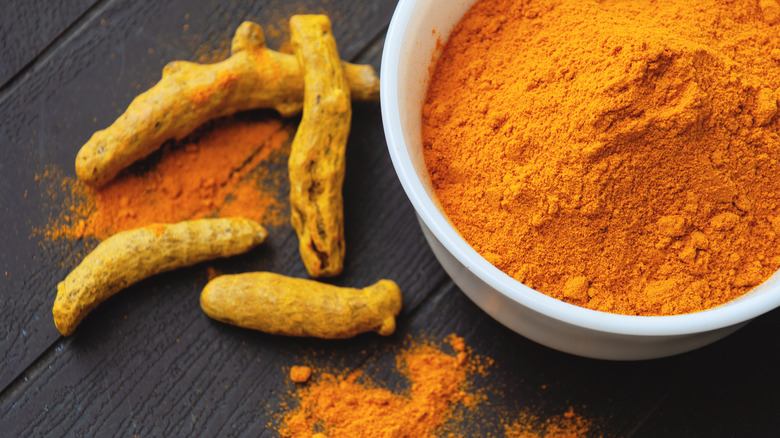Is It Safe To Take A Turmeric Supplement When Pregnant?
Known for its peppery flavor profile and its kingly, golden color, turmeric has long been a staple in every curry-lover's home spice cabinet. Curcumin, the compound that gives turmeric its resplendent hue, is also responsible for the spice's long-standing prominence in the world of herbal medicine (per PBS).
For over 2,000 years, turmeric has been a preeminent force in the practice of ayurvedic medicine – an ancient Indian healing modality that incorporates food and herbs as a key to wellness (per Journal of Pharmacognosy and Phytochemistry). Curcumin has the ability to rid the body of inflammation just as well as ibuprofen — but without any of the toxic effects on the liver. It is also a powerful antioxidant, antifungal, antibacterial, and antiviral. It's tough on cancer-causing free radicals, can help to lower cholesterol, offers protection from stroke, and aids in heart health.
Despite its esteemed position in the world of herbal medicine and the fact that the U.S. Food and Drug Administration deemed curcumin Generally Recognized as Safe, research suggests that turmeric supplements may not be safe for pregnant women. Let's take a closer look.
Turmeric and pregnancy
While no research has been conducted regarding the effects of curcumin on pregnant women, a 2007 study published in Food and Chemical Toxicology found that female rats given curcumin gave birth to pups with lower birth weights. Another 2010 study published in Advances in Molecular Toxicology found that female mice given high levels of curcumin had a lower rate of implantation, as well as pups with lower birth weights.
Although pregnant subjects have been excluded from human studies, research has suggested curcumin might hold influence over the human reproductive system as well. A 2013 study published in the Iranian Journal of Reproductive Medicine reported that curcumin inhibited the growth of endometrial cells (in cases of endometriosis) by lowering estrogen levels.
While there is no evidence deeming curcumin dangerous to pregnant women, most experts agree that pregnant women should steer clear of medicinal doses of curcumin or turmeric — like the dose you might find in turmeric capsules (per Medical News Today). It's suspected that the changes in estrogen levels that occur when taking large amounts of curcumin can induce uterine contractions and bleeding. This increases the chance of pregnancy loss and early labor. However, fresh or dried turmeric in small doses — like you'd have in your favorite Indian dish — are likely to be safe for pregnant people.


